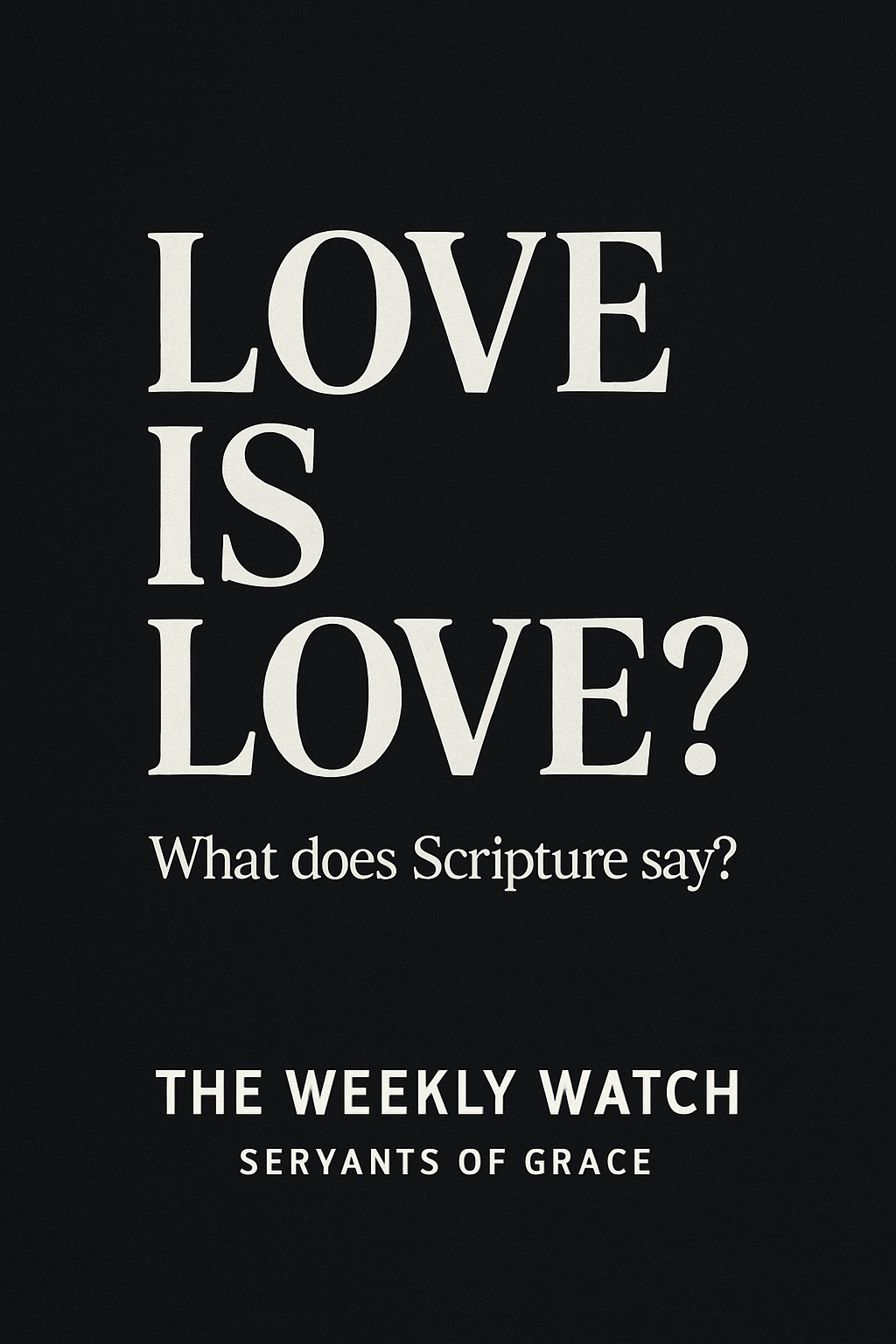⏱️ Estimated Reading Time: 4 min read
What’s Wrong with Saying “Love Is Love”? – The Weekly Watch
By Dave Jenkins
Series: Standing Firm in God’s Design
Date: June 21
“Love is love” is a powerful cultural slogan—but it comes with significant theological consequences.
In this episode of The Weekly Watch, Dave Jenkins investigates how this phrase has redefined love, truth, and identity in our time. With Scripture as the foundation, he challenges Christians to stand firm and speak truth in love in the face of moral confusion and doctrinal compromise.
- Key Scriptures: Isaiah 5:20 • Romans 1:25 • John 14:15 • Jude 1:3 • Ephesians 6:13
- Hosted by: Dave Jenkins
- Presented by: Servants of Grace
🎧 Listen to the Audio
📺 Watch the Video
The Cultural Power of a Phrase
Few phrases have gained as much traction in recent years as “Love is love.” It shows up in corporate ads, political campaigns, social media profiles, and even church signs. To many, it feels like a harmless affirmation of equality and kindness. But beneath its simplicity lies a redefinition of love that carries profound theological implications.
The culture’s version of love often prioritizes affirmation over truth and emotional satisfaction over moral clarity. “Love is love” no longer points to a shared moral framework—it now demands that any and every romantic expression be celebrated as equally valid. And sadly, many Christians have quietly adopted this phrase, unaware of what they’re endorsing.
But love, biblically speaking, is never severed from truth. As 1 Corinthians 13:6 reminds us, love “does not rejoice in wrongdoing, but rejoices with the truth.” True love confronts sin, upholds holiness, and seeks the eternal good of others—even when it’s unpopular or difficult.
When we accept slogans like “Love is love” without discernment, we risk confusing the world about what God says love truly is. We also risk compromising the gospel itself, which calls people not just to be affirmed—but to be transformed.
This episode of The Weekly Watch aims to cut through the fog. We’re not interested in culture wars for the sake of outrage. We’re interested in helping Christians understand and live out God’s definition of love with courage and clarity.
In a time when culture constantly redefines language, Christians must not grow weary of clarifying what God has already made clear. Love, truth, and holiness are not up for revision—they are rooted in the eternal character of God. We do not serve the shifting winds of public opinion; we serve the unchanging Lord of truth. This is why the Church must speak clearly and compassionately, refusing to trade clarity for cultural applause. God’s Word is enough. His truth still saves. And His love is far greater than anything the world can manufacture.
📚 Recommended Resources
❓ Frequently Asked Questions
What does “Love is love” mean from a biblical perspective?
“Love is love” often promotes a definition of love detached from God’s holiness and truth. Scripture teaches that love is rooted in obedience to God’s commands (John 14:15) and rejoices in the truth (1 Corinthians 13:6).
Why is the phrase “Love is love” problematic for Christians?
Because it redefines love in purely emotional or cultural terms, ignoring the boundaries set by Scripture. Biblical love is not self-defined—it’s shaped by the gospel and grounded in God’s character.
How should Christians respond to cultural slogans like “Love is love”?
With truth and compassion. Christians should speak clearly about what God’s Word teaches on love, identity, and obedience, while pointing others to Christ as the standard and source of true love.



